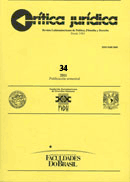El capital: determinación económica y subjetividad política
Main Article Content
Abstract
Marx synthesizes the relationship between the economic base and the political and juridical superstructure stating that the latter emerges from the former. The point is, then, to unfold the concrete form taken by this determination and, consequently, that of the determination of the consciousness with which free individuals govern their actions as organs of the process of social life. Capital is a materialized social relation that constitutes the concrete immediate subject of social life: it places into motion social labor with the immediate aim of multiplying itself as the automatic capacity to place into motion social labor. Capital is an indirect social relation between reciprocally independent human beings, which takes shape through the exchange and competition between commodities. This indirect relation realizes itself in the form of direct antagonistic relations between the owners of commodities, who become thus determined as personifications of commodities. Insofar as the general social relation takes the form of an indirect one, it is determined as an economic relation. Insofar as the latter realizes itself as a direct relation between personifications, it takes the form of a juridical relation. This is a private juridical relation,insofar as one enters it individually; it is a public juridical relation, namely, a political relation, insofaras one enters it as a member of a class in the immediateness of class struggle or in the concrete form the latter takes as it constitutes the relation of State citizenship. That is, in the unity of capital as the general social relation, economic relations are the content of juridical and political relations; in turn, the latter are the necessary forms in which the former realize themselves.
Article Details
How to Cite
Íñigo Carrera, J. (2013). El capital: determinación económica y subjetividad política. Crítica Jurídica. Revista Latinoamericana De Política, Filosofía Y Derecho, (34). https://doi.org/10.22201/ceiich.01883968p.2012.34.35478
